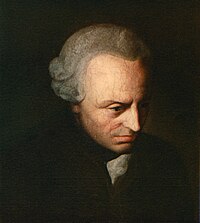
Back المقولة عند كانت Arabic کاتەگۆری (کانت) CKB Categoría (Kant) Spanish مقوله (کانت) Persian 범주 (칸트) Korean Categorie (Kant) Romanian 范畴 (康德) Chinese
| Part of a series on |
| Immanuel Kant |
|---|
 |
|
Category • |
In Immanuel Kant's philosophy, a category (German: Categorie in the original or Kategorie in modern German) is a pure concept of the understanding (Verstand). A Kantian category is a characteristic of the appearance of any object in general, before it has been experienced (a priori). Following Aristotle, Kant uses the term categories to describe the "pure concepts of the understanding, which apply to objects of intuition in general a priori…"[1] Kant further wrote about the categories: "They are concepts of an object in general, by means of which its intuition is regarded as determined with regard to one of the logical functions for judgments."[2] The categories are the condition of the possibility of objects in general,[3] that is, objects as such, any and all objects[clarification needed], not specific objects in particular. Kant enumerated twelve distinct but thematically related categories.
- ^ Kant, Immanuel, Critique of Pure Reason, A 79 (reine Verstandesbegriffe, welche a priori auf Gegenstände der Anschauung überhaupt gehen)
- ^ Kant, Immanuel, Critique of Pure Reason, B129 (Sie sind Begriffe von einem Gegenstande überhaupt, dadurch dessen Anschauung in Ansehung einer der logischen Funktionen zu Urteilen als bestimmt angesehen wird.)
- ^ Kant, Immanuel, Critique of Pure Reason, A 139